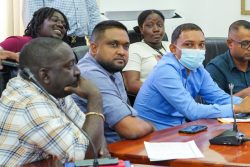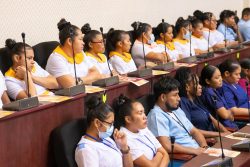Over half a year after President David Granger promised that measures would be put in place to deal with the “evil” of alcohol abuse, a policy has still not been developed.
According to Public Health Minister Dr George Norton, while not much has been done in respect of a defined policy, the adoption of some international best practices is the approach that government would be following.
Among these is the reduction of the availability of alcohol by increasing taxes, which he had previously floated. The minister expressed certainty that the taxes can be increased and said that it has to be done. “It is something I would advocate for, I will push for and I think I will get the support for,” he said, while adding that he plansto begin a series of consultations with non-governmental organisations, such as PAHO/WHO. He was optimistic that the Nurses’ Association and the Guyana Medical Association as well as other civil organisations will come on board.
He also noted that bar owners have to be held responsible for selling persons alcohol and there should be liability incorporated into the law. “I would advocate for that. It is being done in Canada,” he said, while adding that in that country if a bar owner sees a patron intoxicated, they do not allow the person to leave and get behind the wheel of a vehicle.
Norton emphasised also that the approach to address alcohol abuse has got to be multi-sectoral and emphasised the importance of the involvement of the Education Ministry, the Ministry of Social Protection and the Minister of Public Security. Towards this end, he said he was up for meeting with the relevant ministers to create a working plan to deal with excessive drinking. “We don’t have a choice. We have to do that and the earlier we do it the better,” he said, while adding that this could happen by year end.
Last December, President Granger said his administration was very concerned about excessive drinking and the effects it is having on the country and assured that over time measures will be put in place to deal with the “evil.”
He was asked about the government’s response after it had made the ban on smoking in public places a priority when alcohol abuse is more widespread. “There are lots of problems caused by excessive alcohol consumption but I would say yes, I am concerned and I expect in the fullness of time there will be measures to restrict the consumption of alcohol in order to protect society from the impact,” he had said.
Bottom house rum shops being targeted
Minister of Public Security Khemraj Ramjattan noted that he has implemented the 2 am curfew on bars to help curb excessive drinking and pointed out that illegal rum shops are also being targeted.
“We want to take away the licences of the violators and also there are some illegal rum shops in estate areas and rural areas. I want to let GRA [Guyana Revenue Authority] go in and ensure that they take them,” he said.
Asked how soon there will be movement in this direction, Ramjattan noted that GRA has already started doing some work. He said that as the complaints come in, his ministry has been able to identify the bottom house rum shops. “I know because the police have indicated to me that they have closed up about seven or eight for the last week,” he said during a brief interview several weeks ago.
Ramjattan agreed that there are issues with rum shops on the Essequibo Coast. “Big time I agree with that,” he said.
Residents of the Essequibo Coast, in Region Two, recently voiced concerns at the operations of the rum shops in the area, many of which they said go past the 2 am curfew and were opening their doors as early at 8am, including on Sundays. They accused the police there of doing nothing when complaints are made.
“Look, I need 1,000 more policemen. People not joining up. Those same people in Essequibo, they don’t want to join the police force… and they are the ones that are involved in this rum drinking all the time.
We have a huge problem,” he said, while pointing out that government is not solely responsible for interventions; rather, the people are too. “It is a social problem, it is not a political problem… and a lot of them love to go and call up the police station, ‘Come run, run, deh got bullet flying.’ Who makes up the police? Is the people in the community but they don’t want to join and I am 1,000 short,” he stressed.
Counselling
Meanwhile, Minister of Social Protection Volda Lawrence said that the ministry has no written programme to deal with alcohol abuse but there are some officers within the ministry who have been trained to offer psychosocial assistance to persons who have either been a victim of someone who has been intoxicated and persons who are addicted to alcohol.
According to Lawrence, the Probation Department and the Child Care and Protection Agency on a weekly basis receive reports regarding persons imbibing and in most instances “it is persons who head the household.” She said that many times the “lurking danger” of a person within the family environment being out of control is not understood by other family members who visit the ministry. “When they visit the ministry, it’s not that they want these persons to be put away or to be dealt with harshly. Basically, they believe that if someone else outside of their enclosed social gathering can speak with the person, that they would be able to help that person stop imbibing,” she said.
Lawrence said that counselling would be the first step outlined by the probation officer. “There is a lot of talk about counselling but I don’t believe… that persons understand the importance of counselling. They don’t see counselling as a method like that of medication,” she said. Lawrence said that it is for this reason that many persons do not consent to counselling, which is one of the major elements for helping a person to build self-respect, help them control what they put in their bodies and understand the effects drinking will have on their families and themselves.
Asked about the need to collaborate with the Public Health Ministry when it comes to alcohol abuse, she said it’s more than that. “We need to know who is doing what and to what end and so we can join links together and ensure that a person can move from point A right through to point Z and so if a person is put on a programme that programme can either be a collaborative effort or it can be a point programme where we can say to them for the first six weeks, we can work with you and then we will recommend or transfer you to the Ministry of Public Health for the second phase of the programme,” she said.
She stressed that the ministry has not looked at this sort of collaborative arrangement for alcohol abuse but is looking at issues in terms of youth and adolescent and social issues such as suicide and abandonment.
Lawrence pointed out that alcohol cannot be looked at in isolation but rather in the context of other types of substance abuse.








